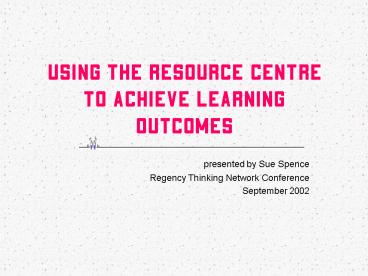Using the Resource Centre to achieve Learning Outcomes PowerPoint PPT Presentation
1 / 24
Title: Using the Resource Centre to achieve Learning Outcomes
1
Using the Resource Centre to achieve Learning
Outcomes
- presented by Sue Spence
- Regency Thinking Network Conference
- September 2002
2
The students are in the library for the third
day in a row. Theyre looking at the same books.
In factJohn is still working on the same
question.
Sarah has abandoned the questions altogether and
just wants to do this bit because its what
shes found.
3
The teacher is feeling frustrated again. The
students dont really want her to show them how
to research the topic, they want to work on
presentation. She can see that they arent
succeeding and that an extension of time is
needed the work isnt getting done.
4
The teacher librarian is exasperated as she
watches yet another student copy out irrelevant
material from an encyclopedia, while several of
the class simply dive for the photocopier.
Case, Jane and Hewett, Sharlene. Lets do a
project. Access No.2 November 1987
How has this scenario changed?!
5
Multi-literacies
6
http//www.mdk12.org/practices/good_instruction/co
nstructivism_2.html
7
http//www.mdk12.org/practices/good_instruction/co
nstructivism_3.html
8
SACSA framework Key Ideas
Arts Design technology English Health
Physical Education Languages Mathematics Science S
ociety Environment
9
SACSA framework Essential Learnings
Futures Identity Interdependence Thinking Communic
ation
10
SACSA framework Key Competencies
- collecting, analysing organising information
- communicating ideas and information
- planning organising activities
- working with others in teams
- using mathematical ideas techniques
- solving problems
- using technology
11
SACSA framework Outcomes/Standards
A continuum of ever improving performance Curricul
um standards or benchmarks Learning programmes
designed to help students reach those
standards We support teach to those
standards Used in monitoring, judging and
reporting on learner achievement
8 10 12
12
Essential Learnings (SA)
13
Overarching Learning Outcomes (WA)
New Basics (Qld)
Across Curriculum Perspectives (ACT)
EsseNTial Learnings
generic skills (Vic)
Essential Learnings (SA)
Broad Learning outcomes (NSW)
Essential Learnings (Tas)
14
How can we use the RC to achieve these SACSAF
requirements?
- Teach and assess key ideas to achieve specific
outcomes in each Learning Area - Ensure Essential Learnings are taught explicitly
- achieve learner centred processes
- provide authentic contexts
- Document our practice within the framework
- Map student progress and report to school
community
15
Information Skills
Multi-literacies
Information literacy
are Thinking Skills
Learning for the Future.1st ed.1993.
16
What the RC can offer you
access to computers
- access
- to TL!
access to resources
17
Collaborative Programming, Planning Teaching
CPPT
- TLs work with classroom teachers to design and
teach assignments that - encourage student initiative and problem-solving
- require analysis, synthesis evaluation of
information - create new understandings/knowledge products
- begin with and value what students already know
- facilitate collaborative learning
- develop their questioning skills
- make explicit to students how they are learning
- challenge students to unlearn ideas to form new
understandings
18
How it can be done
- Redesigning assignments
Providing the scaffolds
Staff PD
19
- How would you, as a student, feel if given this
assignment? - What else would you need to know?
- What do you see as the purpose of this
assignment? - How could you re-shape it to make the task/topic
more - authentic
- engaging
- incorporate Elearrnings
- Select a region of France to research in the
library. - You can either
- Prepare a slideshow on this region
- or
- Create a travel brochure for the region
20
Redesigning assignments
- Change the audience
- Personalise the question
- Vary the format.
- Include local content
- Change the level of student personal involvement
Using Blooms taxonomy to set questions
http//www.kcmetro.cc.mo.us/longview/ctac/blooms.h
tm Divergent thinking model http//www.sacsa.sa.ed
u.au/index_fsrc.asp?tEL go to Thinking and
scroll down
USEFUL LINKS
21
More keys to success
- Bibliography
- Process not just product
- Make effective searching on information
technology part of the assignment outcomes - Clearly state requirements, time-line and
assessment criteria - Build in choice flexibility for different
levels - Monitor progress, use checkpoints
- Plan ahead!!
- Work with your Teacher Librarian!
22
Explicit teaching and assessment
- Inspiration graphic organisers
- http//www.sdcoe.k12.ca.us/score/actbank/torganiz.
htm - MS Word outline
- Isearch log
- Lesson plans
- http//www.edna.edu.au/go/browse/38303A7593Acros
scurr3Acrosslessresulttab - http//school.discovery.com/lessonplans/
- http//www.education-world.com/
- Web quests
- http//webquest.sdsu.edu/webquest.html
- http//ozline.com/learning/index.htm
- Assessment rubrics
- http//coe.ilstu.edu/jabraun/braun/professional/ru
brics/whinrub.html - http//school.discovery.com/schrockguide/assess.ht
ml
23
How do TLs provide scaffolds for teaching and
learning?
- making resources accessible (e.g. Amlib,
selection, publicising resources services)
- print or online templates, guides (e.g. welcome
packs research templates, brochures, pathfinders)
- intranet
24
Staff PD
- Dont think you have to create fresh materials to
do this use what is already available - rblonline http//rblonline.tripod.com/
- New learning tools 4 U
- http//www.adelaidehs.sa.edu.au/ahsintranet/Teache
rs/qtp/qtp.htm - EdNA http//www.edna.edu.au/schools.html
- Ask your friendly TL to find it for you!

